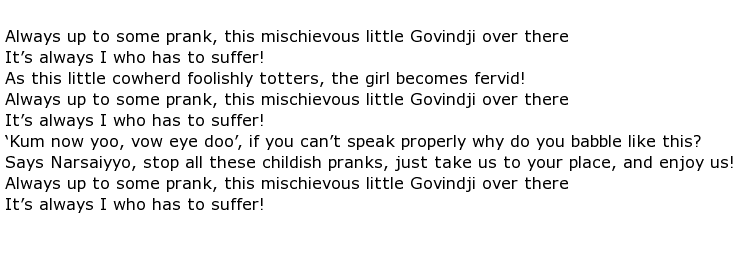Narsinh Mehta is the very first historical poet-saint of Gujarat, India. Mehta was born in the ancient town of Talaja, before moving to be within a Vaishnava Brahmin community. He had a difficult childhood; losing his Mother at the tender age of five and being cared for by his Grandmother. He was unable to speak until the age of eight, and was very much a lost little boy in many ways. It is highly possible that his works came from a grown man, who still had that little boy inside, searching for love, acceptance and comfort.
Narsinh Mehta wed in 1429 to Manekbai and they began married life staying with Mehta’s brothers home. This wasn’t to be in harmony; Mehta and his sister-in-law did not get along, it was said she was an ill-tempered woman who regularly taunted Mehta regarding his worship in particularly. One day, Narsinh has enough of her insults and left the house to find some peace in a nearby forest. It is then when he meditated and fasted for a week and believed that after this time Shiva appeared before his eyes. This began his journey into spirituality, which was something he wholeheartedly embraced throughout his life and in all of his poems.
Legend has it that when Narsinh Mehta was shown the eternal raas leela of Sri Krishna he was so transfixed that he burnt his hand with his torch, yet never noticed the pain due to being so engrossed in the vision. After this dream-like experience, Mehta was a changed man and when he returned to his village he thanked his sister-in-law genuinely, as her insults and ridicule had led him to see the light.
Due to the following and fondness of Narsinh Mehta, his poems are not available in the language they were written and instead have been preserved orally. He composed poems of many different genres which can be divided into three categories:
Autobiographical Compositions:
Mehta’s work fitting into this category include compositions such as: Hundi, Jhari Na Pada, Putra Vivah, Mameru and Har Same No Pada. These works incorporate many factors of Mehta’s life and include how he met the Divine in many different guises. They speak of ‘miracles’ which show how the poet was helped by Narsaiyya’s Lord in times of crises.
Miscellaneous Narratives:
Dana Leela, Sudama Charit, Charturis and episodes which were based on Srimad Bhagwatam. These spoke of erotic exploitations of tolls, taxes and dues and many thoughts on domestic life during his era. Mehta wrote from the heart, with compassion and spirituality in whatever genre he turned his hand to. He also writes with fondness regarding is own childhood pranks and the many adventures he had.
Songs of Sringar:
Erotic adventures is the main angle for this category. Spirituality, hope, love and motivation are what have led these songs to be so popular and regularly sang even today – thousands of years after they were created.
One of Mehta’s pieces speaking of his childhood, named ‘’Another Childish Prank’’…


